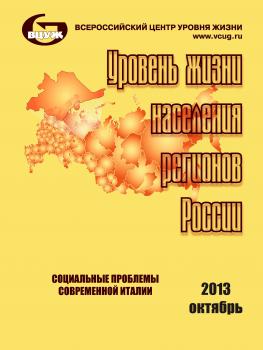Russian Federation
The article considers the problem of improving living standards in Russia as an urgent necessity. The task of establishing minimum wages not lower than the subsistence minimum of able-bodied population is urgent too. The existing long-term imbalance has a direct negative impact on the level of poverty in our country. The article presents proposals on raising the minimum wage to the subsistence minimum of able-bodied population. The paper presents the calculations (for 2000–2013,) the ratio of the minimum wage established a number of Federal laws of the Russian Federation in the period 2000–2013 years, and the subsistence minimum of able-bodied population, information on the amount which, in accordance with Art. 7 of the Federal law of October 24, 1997, № 134-FZ «On subsistence minimum in the Russian Federation», is published quarterly in official publications of the Government of the Russian Federation and official publications of bodies of Executive power of subjects of the Russian Federation; the ratio of the minimum wage and average wage in the same period, the amount of which is also published the official statistical bodies; the authors of the analysis of the obtained results. Additionally studied and analyzed similar indicators in other countries, the comparative analysis of these indicators with the Russian. In conclusion, based on the study, the authors proved the necessity of bringing the minimum wage to the subsistence minimum of the able-bodied population, and presents a number of suggestions for achieving that goal, including tactics, terms and financial sources of the problem solution. Notes that the decision of the analyzed problems will contribute to the stabilization of the economic situation in Russia, reducing the level of poverty within the country, as well as weakening the dependence of our country from foreign importers.
feasible task, poverty, minimum wage, wage earners, the subsistence minimum of able-bodied population, the average wage
Еще раз о том, почему в России плохо быть бедным и почему надо, как минимум, уравнивать минимальный размер оплаты труда (МРОТ) и прожиточный минимум трудоспособного населения (ПМтр). Мы поведем речь об экономической бедности, которая обусловлена недостатком у домо- хозяйств трудовых и предпринимательских доходов. Она не связана со снижением или потерей трудоспособности экономически активным населением. В последнем случае бедность является социальной и требует от государства адресной социальной поддержки соответствующих домохозяйств.
Экономическая бедность — результат перекосов государственной экономической политики. Не должно быть так, чтобы работник, выполняющий нормы труда, получал заработную плату, не позволяющую его семье преодолеть бедность. Размер минимальных доходов в домохозяйствах наемных работников должен регулироваться установлением обоснованных государством размера минимальной оплаты труда и установлением детских пособий. Это особо острая социальная проблема для современной России. Дело в том, что для тех домохозяйств, которые входят в разряд бедных в результате того, что получают зарплату в размере МРОТ (и ниже) до ПМтр, этого заработка не хватает для того, чтобы восстановиться и просто выжить. Ведь главная воспроизводственная функция оплаты труда в том и состоит, что она (зарплата) должна быть достаточной для компенсации тех затрат (физических, физиологических, интеллектуальных и т.п.), которые имеет человек в процессе своей трудовой деятельности и жизни как таковой (ведь чтобы жить и работать, надо питаться, одеваться, лечиться, восстанавливаться и т.д.). Если заработная плата ниже ПМтр, парадокс, но факт, что тем самым работодатель и государство дают согласие на возможность недокомпенсации этих затрат работникам, для которых, прежде всего, доход размером ниже прожиточного минимума является единственным. На наш взгляд, официальное разрешение и допущение выплаты работодателями наемному работнику зарплаты, недостаточной для выживания человека, нельзя объяснить никакими причинами и проблемами, в том числе экономическими кризисами и даже известными природными катаклизмами [Волгин, 2009. 2, с. 5–8.].
1. Bobkov V.N., Mir Rossii, 2012, № 2, s. 3-26.
2. Volgin N.A. Oplata truda - stimul ili tormoz: nekotorye problemy teorii i sovremennoy praktiki. Sotsial´naya politika i sotsial´noe partnerstvo. 2009. №6, s.5-11.
3. Evrostat. (http://epp.eurostat.ec.europa.eu/portal/page/portal/labour_market/earnings/database)
4. Kachestvo i uroven´ zhizni naseleniya v novoy Rossii, ruk. avt. koll. V.N. Bobkov 2007, 718 s.
5. Ofitsial´nyy sayt Ministerstva ekonomicheskogo razvitiya RF (http://www.economy.gov.ru/minec/main).
6. Rossiyskiy statisticheskiy ezhegodnik - 2013 g. (http://www.gks.ru/).
7. Sayt bs-life.ru (data obrashcheniya: 09.04.2014 g.).
8. Sotsial´noe polozhenie i uroven´ zhizni naseleniya Rossii (http://www.gks.ru/).
9. Trudovoy kodeks Rossiyskoy Federatsii ot 30.12.2001 g. № 197-FZ.
10. Federal´nyy zakon ot 24.10.1997 N 134-FZ.
11. Federal´nyy zakon ot 19.06.2000 N 82-FZ.
12. Federal´nyy zakon ot 29.04.2002 N 42-FZ.
13. Federal´nyy zakon ot 01.10.2003 N 127-FZ.
14. Federal´nyy zakon ot 29.12.2004 N 198-FZ.
15. Federal´nyy zakon ot 20.04.2007 N 54-FZ.
16. Federal´nyy zakon ot 24.06.2008 N 91-FZ.
17. Federal´nyy zakon ot 01.06.2011 N 106-FZ.
18. Federal´nyy zakon ot 03.12.2012 N 232-FZ.





